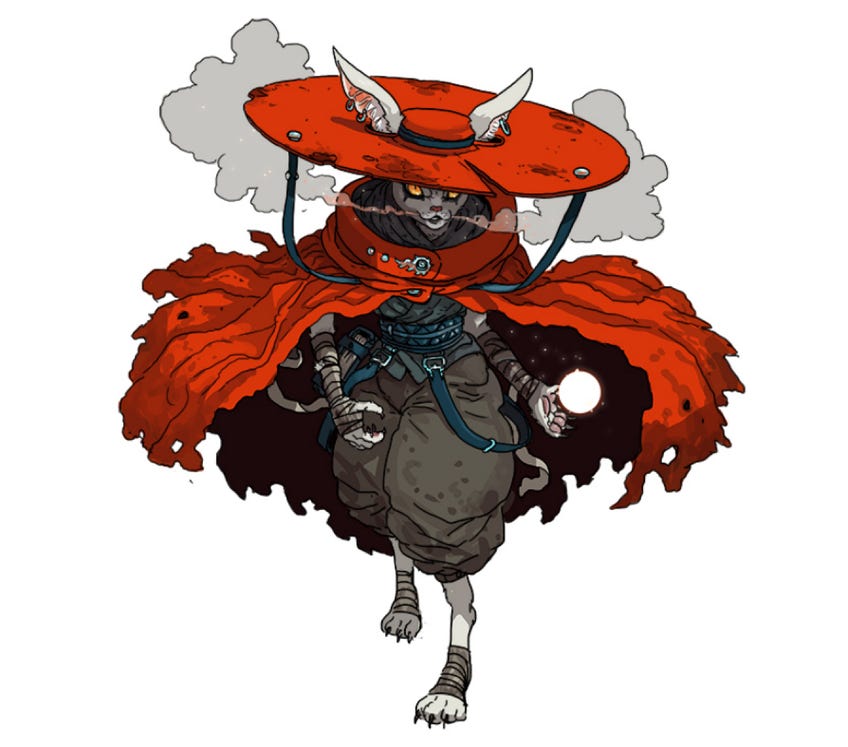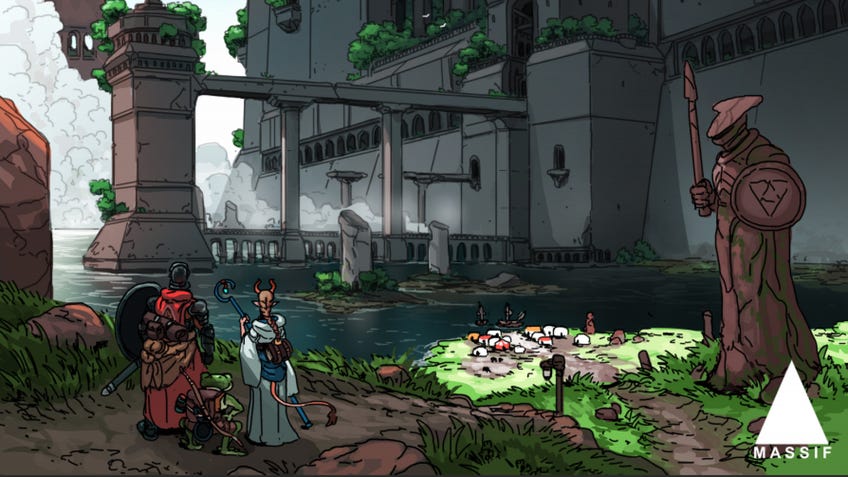Lancer co-creator’s new post-apocalyptic RPG Icon has a free playtest version that's worth a look
A heavy pinch of Final Fantasy and Breath of the Wild in a pastoral world of broken peace.
The next generation of heroes were born at the beginning of the Churning Age, a time when peace in Arden Eld gave way to old dangers and older magic. Upcoming tabletop RPG Icon tells the story of these heroes as they seek out ancient power and amass it for themselves in a bid to reshape the world according to their own principles.
Icon is the latest work of Tom Parkinson-Morgan, the co-designer of mech-based RPG Lancer and creator of webcomic Kill Six Billion Demons. Parkinson-Morgan, who goes by Abaddon online, released a free, 140-page playtest version on July 27th that gives groups everything they need to begin a grand adventure with larger-than-life protagonists.
“I love that old-school mysterious, enormous-world fantasy vibe that is reproduced so well in animation, comics, and games,” he says in the digital book. “This game is inspired by the feeling I think you might get when you look at the main cover. I took inspiration from anime, the works of French comic artist Möebius, Studio Ghibli, and video games like Shadow of the Colossus, Dragon’s Dogma, and the Legend of Zelda.”
Those inspirations are evident in the world of Arden Eld, which is portrayed as largely peaceful. The peoples who inhabit it enjoy pastoral lives among the ruins of an ancient empire long since reclaimed by nature, its small towns connected by stretches of roads plenty safe for travelers, trading caravans and aimless wanderers. At least, it was until Arknel Imperial ruins began erupting from the ground like abcessed teeth.
Now, adventurers, plunderers and opportunists rush to nab the technology and relics held within. The player characters are no different - the meat of actually playing Icon involves delving into forgotten temples and timeworn dungeons to collect what lies in their depths - but their goals are to become powerful enough to stabilize the world and see it through the coming season of changes.
Parkinson-Morgan said he wanted to create a tabletop system that told stories of gathering power, but also healing and learning alongside that growth. “Heroic in this context doesn’t necessarily mean ‘altruistically motivated’ but fated, or larger than life,” he writes. Player characters are assumed to be exemplary martial athletes, potent arcane adepts and preternaturally deadly. How they use those extraordinary abilities drives one of the system's core narrative engines.

Icon takes an interesting tack when it comes to combat, providing rules and moves for both narrative encounters and those where violence is the only solution left. The default storytelling approach gives players initiative and most of the control, empowering them to navigate social encounters, puzzles and interpersonal conflicts. When combat erupts, the group must first establish material stakes, and dropping a foe to 0 hit points does not default to meaning they are killed.
“The most important rule to stick by is that monsters are never people, and people are never monsters,” the rules clarify. “If monsters are intelligent enough to be a character in their own right, or bargain with or be characters in their own right, treat them like Kin.”
Character creation splits its time between bonds and jobs. The former is more akin to the character’s guiding principles - how they approach life and what drives them in their life as a wandering protector. Taking a page from Blades in the Dark, Icon details how each bond seeks to relieve stress accrued during adventuring, along with narrative and combat powers unique to that set of values.

Jobs function closer to classes in a traditional sense, except for the fact that characters will have the ability to change them in between adventures. If that sounds a bit like the Final Fantasy video game series, wait until you hear that Icon has Limit Breaks - costly ultimate abilities with frightening raw power and names such as "Split Heaven and Hell" or "Gran Levincross".
The four meta-classes - Stalwart, Mendicant, Vagabond and Wright - cover the fundamental fantasy party breakdown of melee fighters, ranged fighter, healers and magic users but are each broken down into sub-classes that offer more distinct playstyles. Shifting between these approaches give characters flexibility and keep combat fresh from one session to the next.
There’s honestly a lot to cover in the sizable preview Parkinson-Morgan is providing for free on his Itch.io page, from the upgradeable camps (that could be airships) and ancient relics with hidden potential, to the free beginner adventure at the end of the book. His artwork, alone, is worth downloading for a peek at the fantastical landscapes and the Kin who inhabit them.
Icon has no current release date, nor has Parkinson-Morgan revealed any plans for a physical release or Kickstarter campaign. Keep checking back with Dicebreaker for further developments in the world of Arden Eld.

